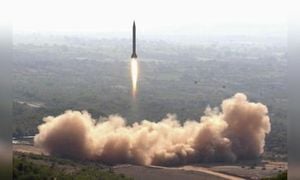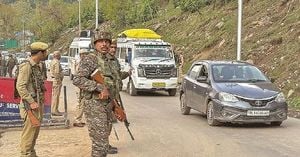Vancouver has recently found itself at the center of controversy following a rally where disturbing chants, including calls for "death to Canada" surfaced. This protest coincided with the first anniversary of the October 7 Hamas attacks on Israel, which changed the dynamics of the Israeli-Palestinian conflict.
On October 7, 2024, hundreds gathered at the Vancouver Art Gallery for the pro-Palestinian rally, organized by the Samidoun Palestinian Prisoner Solidarity Network. The tension on the ground escalated as moments unfolded where participants burned Canadian flags under the leadership of a masked speaker. Videos proliferated on social media, showing her defiantly declaring, "we are Hezbollah and we are Hamas," and leading chants targeting Canada, the United States, and Israel.
Both Hamas and Hezbollah are classified by Public Safety Canada as terrorist entities, which adds another layer of complexity and urgency to the situation. Community leaders, including various political figures from both federal and provincial levels, have roundly condemned the rhetoric displayed at the event. Federal Conservative Leader Pierre Poilievre emphasized the dangers of such groups operating freely within Canada, calling out their attempts to raise funds for initiatives supporting violence against Jews. He stated, "While Jewish Canadians live in fear, terror groups like Samidoun are free to fundraise and support organizations like Hamas. We've seen what happens when these groups aren't taken seriously."
These sentiments echoed throughout the political spectrum, as members of the Conservative Party demanded immediate action to add Samidoun to the list of banned terrorist organizations should they secure control of the government. On social media, Conservative MP Melissa Lantsman criticized the government's reluctance to act, saying, "If burning a Canadian flag, if calling for the death of Canadians... if being a front for already-listed terrorist organizations is not enough to put them on the list, then what the hell is it going to take for them to ban them?"
The reaction from local authorities and the public to the rally was swift. The Vancouver Police Department, stressing its commitment to protecting the fundamental freedom of expression as per the Canadian Charter, nonetheless stated they were reviewing whether actions taken during the rally constituted any criminal conduct. They indicated receiving feedback from the community, illustrating how deeply offended many were by the actions they witnessed.
Vancouver police acknowledged the need to investigate if the protest violated any laws, particularly concerning the safety of attendees. The police stated, "Burning materials in any crowded place could damage property or endanger others, and anyone who breaks the law is subject to arrest and charges." While no arrests were reported during the protest, the department is carefully examining the videos and testimonies collected.
Political leaders from both the NDP and Conservative parties voiced their disapproval. B.C. NDP Leader David Eby remarked on social media, labeling the speech as "hateful rhetoric" with no place within the province. His remarks were compounded by B.C. Conservative Leader John Rustad, who labeled the protest behavior as "completely unacceptable." Rustad pledged to clamp down on such expressions of hate if elected.
The link between the protest and rising antisemitism has been noted prominently, particularly by local Jewish organizations. Ezra Shanken, CEO of the Jewish Federation of Greater Vancouver, pointed out how conditions have worsened since the October 7 incident last year, referring to increased antisemitic hate incidents and drawing parallels with the actions of Samidoun. The timeline of the B.C. Prosecution Service’s review adds to the distress within the local Jewish community, which has increasingly felt vulnerable since these events unfolded.
Adding to the conversation, the director of Samidoun, Charlotte Kates, is no stranger to controversy. She had previously been arrested last year during a hate-crime investigation for her comments applauding the Hamas attack as "heroic and brave." This prior incident raises questions about the organization’s overall agenda and intentions, especially as it regularly organizes events focused on Palestinian prisoner solidarity. The expired conditions related to Kates' release have prompted backlash, as many fear this legal leniency might enable continued incitement of divisive sentiments against Jewish communities.
On October 8, the following day after the protest, Vancouver police maintained their stance on ensuring safety and inclusivity, with police efforts to monitor future events where potential hate speech or incitement might arise. They reiterated their commitment to public safety and the urgency of investigating incidents associated with groups like Samidoun, noting how these influences could extend beyond mere protests to create serious community ramifications.
The rally serves as both a stark reminder of how divisive the Israeli-Palestinian conflict continues to be, and the way these tensions can spill over onto Canadian soil. With upcoming elections and growing rhetoric surrounding freedom of expression versus hate speech, the political ramifications represent not just local concerns but also wider national dialogues about security, identity, and unity within Canada.
Political leaders across the spectrum remain alert, aware of their responsibility to address these issues as they strive to balance the imperative of free speech with the necessity of ensuring public safety and communal harmony.



